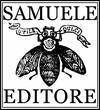Patrick Williamson’s Traversi/Crossings illustrates one strand of this diversity neatly, being a bilingual English/Italian collection of poems by an English poet who lives in France and published in the North East of Italy. The title of the book refers to the idea of displacement, of movement, specifically the displacement of those fleeing war, oppression and extreme want, from Holocaust survivors to refugees attempting to cross the Mediterranean to Europe, generally in terse, unsentimental verses.
solitary passengers
rivulets of sweat
seeping into distressed
forms triggered
swept away by a switch
intensity, illumination
brace yourself
hurtle
through water
to light
There are also moments when we are reminded that a crossing may also be a crossing out, an erasure. The poems recognise the reality that for many migrants or potential migrants, the light at the end of the journey may not always be a welcome one, or that the journey might never even begin, as in this image taken, I think, from Gaza:
morning uncovers rubble, crunching
how can you love the spring
the morgues are full
dead children in ice cream cabinets
It is natural given the weight of events for a poet to question the worth, the validity of writing, to wonder at the inadequacy of art when it seems we are all complicit in the horrors of the world. In Williamsons case, this takes the form of a critique of Samuel Beckett’s Quad as seen through a lens of extraordinary rendition:
It was too beautiful
Not the brutalised men, 24/7
Somewhere in nowhere, no time
It’s an understandable reaction, but Williamson is too much the poet not to realise the need to create, especially in the face of wholesale destruction, not just of people and places, but of the values that art can, just by existing, stand for. In the end, beauty has a value as a form of resistance to the cheapened and cheapening rhetoric of oppression:
The word on the page is unscarred
and writing the glue,
only replicants seal wounds cleanly
so no trace remains;
we always leave a trace,
an identity in the cloud, portrait with Gray,
perfect to leave our ugliness behind.
The traces Williamson leaves in this little book form another kind of crossing, the bringing over of horror into art, which, whatever its inadequacies, is part of what makes us human, and therefore part of what we are obliged to fight for, to preserve.
Billy Mills
Continua su Elliptical Movements


